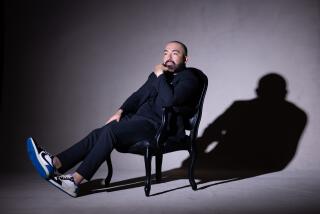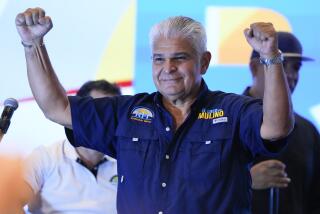Valentin Paniagua, 69; Led Peru to Democracy After Fall of Fujimori’s Regime
- Share via
Valentin Paniagua, a law professor who shepherded Peru back to democracy as interim president after the 2000 collapse of Alberto Fujimori’s autocratic regime, died Monday. He was 69.
Paniagua had been hospitalized in Lima with respiratory problems since undergoing surgery in August for inflammation of his heart membrane.
The death of Paniagua, who governed Peru from November 2000 to July 2001, was announced by Jorge del Castillo, Peru’s current cabinet chief.
“Paniagua played a fundamental role in the recuperation of the nation’s democracy,” del Castillo told Radioprogramas del Peru in Lima. “He brought tranquillity and order to Peru.”
President Alan Garcia’s government announced a day of national mourning, decreeing that businesses and government offices close today after midday.
Paniagua governed for only eight months, but in that short time he forged a legacy for leading a broad-based government that took big strides toward rebuilding Peru’s tattered democracy, including overseeing clean elections.
In November 2000, Paniagua was the head of the opposition-led Congress during a six-day succession crisis. Fujimori fled Peru as his 10-year authoritarian government crumbled amid scandals involving his shadowy security advisor, Vladimiro Montesinos.
Paniagua became interim president after Fujimori’s two vice presidents resigned. He faced the enormous challenge of supervising elections and enforcing a mandate to root out vast government and military corruption.
He organized elections held in April 2001. Alejandro Toledo won the presidency that year after a runoff election in June.
A balding, diminutive man with a pencil-thin mustache, Paniagua had the air of the law professor that he was. He was unassuming, avoiding interviews and news conferences during his interim government.
Knowing that his time in office was short, he never moved into the opulent presidential palace, preferring to commute from the suburbs.
Paniagua left office with popularity ratings of nearly 70%. Surveys as recently as a year ago showed that he was the favorite to win this year’s presidential election, held in June.
But he delayed entering the race, and when party leaders finally persuaded him to run, he admittedly lacked the needed focus, finishing fifth among 20 candidates.
Valentin Paniagua Corazao was born and raised in Cuzco, the ancient capital of the Inca empire, and spoke the Indian language Quechua as well as Spanish, English and French.
More to Read
Sign up for Essential California
The most important California stories and recommendations in your inbox every morning.
You may occasionally receive promotional content from the Los Angeles Times.













